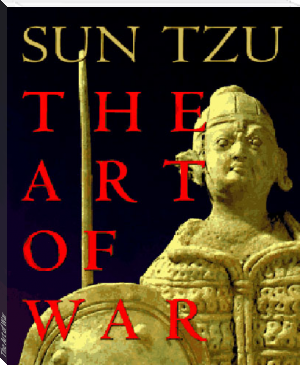The Art of War - Zi Sun (best books to read for success .txt) 📗

- Author: Zi Sun
- Performer: 0976072696
Book online «The Art of War - Zi Sun (best books to read for success .txt) 📗». Author Zi Sun
On desperate ground, I would proclaim to my soldiers the hopelessness of saving their lives.
Tu Yu says: "Burn your baggage and impedimenta, throw away your stores and provisions, choke up the wells, destroy your cooking-stoves, and make it plain to your men that they cannot survive, but must fight to the death." Mei Yao-ch`en says: "The only chance of life lies in giving up all hope of it." This concludes what Sun Tzu has to say about "grounds" and the "variations" corresponding to them. Reviewing the passages which bear on this important subject, we cannot fail to be struck by the desultory and unmethodical fashion in which it is treated. Sun Tzu begins abruptly in VIII. ss. 2 to enumerate "variations" before touching on "grounds" at all, but only mentions five, namely nos. 7, 5, 8 and 9 of the subsequent list, and one that is not included in it. A few varieties of ground are dealt with in the earlier portion of chap. IX, and then chap. X sets forth six new grounds, with six variations of plan to match. None of these is mentioned again, though the first is hardly to be distinguished from ground no. 4 in the next chapter. At last, in chap. XI, we come to the Nine Grounds par excellence, immediately followed by the variations. This takes us down to ss. 14. In SS. 43-45, fresh definitions are provided for nos. 5, 6, 2, 8 and 9 (in the order given), as well as for the tenth ground noticed in chap. VIII; and finally, the nine variations are enumerated once more from beginning to end, all, with the exception of 5, 6 and 7, being different from those previously given. Though it is impossible to account for the present state of Sun Tzu's text, a few suggestive facts maybe brought into prominence: (1) Chap. VIII, according to the title, should deal with nine variations, whereas only five appear. (2) It is an abnormally short chapter. (3) Chap. XI is entitled The Nine Grounds. Several of these are defined twice over, besides which there are two distinct lists of the corresponding variations. (4) The length of the chapter is disproportionate, being double that of any other except IX. I do not propose to draw any inferences from these facts, beyond the general conclusion that Sun Tzu's work cannot have come down to us in the shape in which it left his hands: chap. VIII is obviously defective and probably out of place, while XI seems to contain matter that has either been added by a later hand or ought to appear elsewhere.]
51. For it is the soldier's disposition to offer an obstinate resistance when surrounded, to fight hard when he cannot help himself, and to obey promptly when he has fallen into danger.
[Chang Yu alludes to the conduct of Pan Ch`ao's devoted followers in 73 A.D. The story runs thus in the HOU HAN SHU, ch. 47: "When Pan Ch`ao arrived at Shan-shan, Kuang, the King of the country, received him at first with great politeness and respect; but shortly afterwards his behavior underwent a sudden change, and he became remiss and negligent. Pan Ch`ao spoke about this to the officers of his suite: 'Have you noticed,' he said, 'that Kuang's polite intentions are on the wane? This must signify that envoys have come from the Northern barbarians, and that consequently he is in a state of indecision, not knowing with which side to throw in his lot. That surely is the reason. The truly wise man, we are told, can perceive things before they have come to pass; how much more, then, those that are already manifest!' Thereupon he called one of the natives who had been assigned to his service, and set a trap for him, saying: 'Where are those envoys from the Hsiung-nu who arrived some day ago?' The man was so taken aback that between surprise and fear he presently blurted out the whole truth. Pan Ch`ao, keeping his informant carefully under lock and key, then summoned a general gathering of his officers, thirty-six in all, and began drinking with them. When the wine had mounted into their heads a little, he tried to rouse their spirit still further by addressing them thus: 'Gentlemen, here we are in the heart of an isolated region, anxious to achieve riches and honor by some great exploit. Now it happens that an ambassador from the Hsiung-no arrived in this kingdom only a few days ago, and the result is that the respectful courtesy extended towards us by our royal host has disappeared. Should this envoy prevail upon him to seize our party and hand us over to the Hsiung-no, our bones will become food for the wolves of the desert. What are we to do?' With one accord, the officers replied: 'Standing as we do in peril of our lives, we will follow our commander through life and death.' For the sequel of this adventure, see chap. XII. ss. 1, note.]
52. We cannot enter into alliance with neighboring princes until we are acquainted with their designs. We are not fit to lead an army on the march unless we are familiar with the face of the country—its mountains and forests, its pitfalls and precipices, its marshes and swamps. We shall be unable to turn natural





Comments (0)